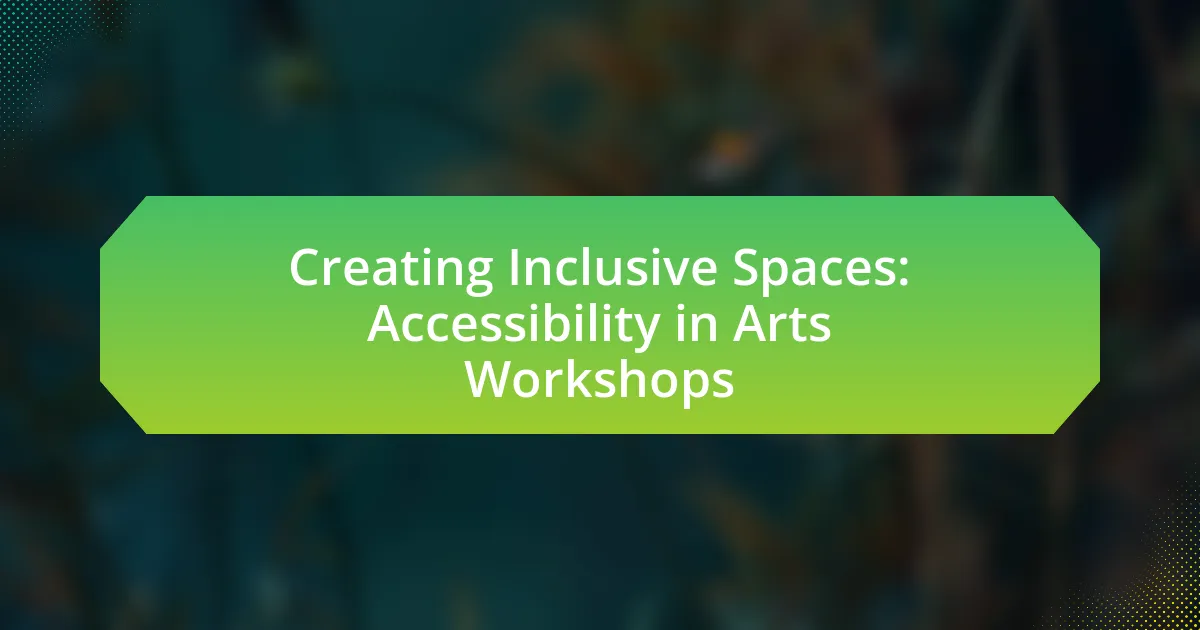Choosing the right venue for a creative workshop is crucial for ensuring participant engagement and satisfaction. Key factors to consider include location, capacity, amenities, and ambiance, as these elements directly influence attendance and the overall workshop experience. The article outlines how accessibility impacts participation, the advantages of central locations, and the importance of suitable size and layout for fostering collaboration. Additionally, it discusses essential amenities, technology availability, catering options, and best practices for evaluating potential venues, while highlighting common pitfalls to avoid in the venue selection process.

What factors should you consider when choosing a venue for your creative workshop?
When choosing a venue for your creative workshop, consider factors such as location, capacity, amenities, and ambiance. The location should be easily accessible for participants, ideally near public transportation or parking facilities. Capacity is crucial; the venue must comfortably accommodate the expected number of attendees to foster interaction and engagement. Amenities like audio-visual equipment, seating arrangements, and breakout spaces enhance the workshop experience. Lastly, the ambiance should align with the creative nature of the workshop, providing an inspiring environment that encourages creativity and collaboration. These factors collectively ensure a successful and productive workshop.
How does the location impact attendance and participation?
Location significantly impacts attendance and participation by influencing accessibility and convenience for potential attendees. A venue situated in a central area with good transportation links tends to attract more participants, as evidenced by studies showing that events in easily reachable locations see up to 30% higher attendance rates compared to those in remote areas. Additionally, the surrounding environment can affect participants’ willingness to engage; for instance, a creative workshop held in an inspiring setting may foster greater interaction and collaboration among attendees.
What are the advantages of a central location versus a remote one?
A central location offers advantages such as accessibility, visibility, and networking opportunities compared to a remote one. Central locations are typically easier for participants to reach, reducing travel time and costs, which can lead to higher attendance rates. For instance, a study by the International Association of Venue Managers found that venues in urban areas attract 30% more attendees than those in remote locations. Additionally, central venues often provide better amenities and services, enhancing the overall experience for participants. Networking opportunities are also greater in central locations, as they attract a diverse group of individuals, fostering collaboration and idea exchange.
How can accessibility influence your choice of venue?
Accessibility significantly influences the choice of venue by determining whether all participants can comfortably and safely attend the event. A venue that is accessible includes features such as ramps, elevators, and appropriate restroom facilities, which are essential for individuals with mobility challenges. According to the Americans with Disabilities Act (ADA), venues must meet specific accessibility standards to ensure equal access for individuals with disabilities. Choosing an accessible venue not only complies with legal requirements but also fosters inclusivity, allowing a diverse range of participants to engage fully in the creative workshop.
What size and layout are ideal for your workshop?
The ideal size for a workshop typically ranges from 15 to 30 participants, allowing for effective interaction and engagement. A layout that promotes collaboration, such as a U-shape or circular arrangement, facilitates discussion and group activities. Research indicates that smaller groups enhance learning outcomes, as noted in studies by the American Educational Research Association, which found that participant engagement increases significantly in settings accommodating fewer than 30 individuals. Therefore, a workshop venue should be spacious enough to comfortably fit this number while allowing for movement and interaction among participants.
How do you determine the appropriate capacity for your attendees?
To determine the appropriate capacity for your attendees, assess the expected number of participants based on registration data and historical attendance figures. For instance, if previous workshops attracted 80% of registered participants, and you anticipate 100 registrations, you should prepare for at least 80 attendees. Additionally, consider the venue’s layout and the type of activities planned; interactive sessions may require more space per person compared to lectures. This approach ensures comfort and engagement, aligning with best practices in event planning.
What layout options can enhance creativity and collaboration?
Flexible layout options such as open floor plans, collaborative workspaces, and breakout areas can significantly enhance creativity and collaboration. Open floor plans encourage spontaneous interactions and idea sharing, while collaborative workspaces provide tools and resources that facilitate teamwork. Breakout areas allow for smaller group discussions, fostering deeper engagement and creativity. Research indicates that environments designed for collaboration can increase productivity by up to 25%, demonstrating the effectiveness of these layout options in promoting creative outcomes.
What amenities and facilities should the venue provide?
The venue should provide essential amenities and facilities such as adequate seating, audio-visual equipment, Wi-Fi access, restrooms, and catering options. Adequate seating ensures comfort and engagement for participants, while audio-visual equipment facilitates presentations and workshops effectively. Wi-Fi access is crucial for connectivity and resource sharing, and accessible restrooms are necessary for convenience. Catering options enhance the overall experience by providing food and beverages, which can keep participants energized and focused. These amenities contribute significantly to the success of a creative workshop by ensuring a conducive environment for learning and collaboration.
How important is technology availability for your workshop?
Technology availability is crucial for a workshop as it directly impacts the effectiveness of the learning experience. Access to modern tools such as projectors, computers, and high-speed internet facilitates interactive sessions and enhances participant engagement. Research indicates that workshops equipped with appropriate technology can increase retention rates by up to 60%, demonstrating the significant role technology plays in educational settings. Therefore, ensuring technology availability is essential for maximizing the workshop’s potential and achieving desired outcomes.
What catering options should you consider for your attendees?
When considering catering options for attendees, you should evaluate dietary preferences, meal types, and service styles. Offering a variety of dietary options, such as vegetarian, vegan, gluten-free, and allergen-free meals, ensures inclusivity and satisfaction among diverse attendees. Meal types can include breakfast, lunch, snacks, and beverages, tailored to the schedule of the workshop. Service styles, such as buffet, plated meals, or food stations, can enhance the dining experience and facilitate networking. Research indicates that 70% of event attendees consider food quality as a key factor in their overall satisfaction, highlighting the importance of thoughtful catering choices.

How can you evaluate potential venues for your creative workshop?
To evaluate potential venues for your creative workshop, assess factors such as location, capacity, amenities, and cost. Location is crucial; it should be accessible to participants, ideally near public transport or parking. Capacity must accommodate your expected number of attendees comfortably, ensuring a conducive environment for creativity. Amenities like lighting, seating arrangements, and technology support (e.g., Wi-Fi, projectors) enhance the workshop experience. Cost should align with your budget while considering the value offered by the venue. According to a survey by Eventbrite, 70% of event organizers prioritize venue accessibility and amenities when selecting a location, highlighting the importance of these factors in venue evaluation.
What criteria should you use to assess each venue?
To assess each venue for a creative workshop, consider the following criteria: location, capacity, facilities, accessibility, ambiance, and cost.
Location is crucial as it should be convenient for participants, ideally near public transport or parking. Capacity must accommodate the expected number of attendees comfortably, ensuring a conducive environment for interaction. Facilities should include necessary equipment such as projectors, whiteboards, and Wi-Fi, which are essential for effective workshops. Accessibility is important for participants with disabilities, ensuring that the venue complies with regulations and offers ease of movement. Ambiance affects creativity; a well-lit, inspiring space can enhance the workshop experience. Lastly, cost must align with the budget, factoring in any additional fees for services or equipment.
These criteria collectively ensure that the chosen venue supports the goals of the creative workshop effectively.
How do you prioritize your venue requirements?
To prioritize venue requirements, I assess the essential factors such as location, capacity, amenities, and budget. Location is critical as it affects accessibility for participants; a central or easily reachable venue increases attendance. Capacity must align with expected participants to ensure comfort and engagement; for instance, a workshop with 30 attendees requires a space that accommodates at least that number. Amenities, including technology support and breakout spaces, enhance the workshop experience; venues equipped with audiovisual tools facilitate presentations and discussions. Lastly, budget constraints dictate the feasibility of options; selecting a venue within budget ensures financial viability. Prioritizing these factors based on the specific goals of the workshop leads to an effective venue selection process.
What role does budget play in your venue evaluation?
Budget is a critical factor in venue evaluation as it directly influences the selection process and overall feasibility of hosting an event. A well-defined budget helps identify venues that align with financial constraints, ensuring that costs such as rental fees, catering, and equipment are manageable. According to a survey by Eventbrite, 60% of event planners cite budget as the primary determinant in venue selection, highlighting its significance in decision-making.
How can you gather feedback on potential venues?
To gather feedback on potential venues, conduct surveys or interviews with participants who have visited the venues. This method allows for direct insights into their experiences, preferences, and any concerns they may have. According to a study by the Event Marketing Institute, 70% of attendees prefer to provide feedback through surveys, indicating that this approach is effective for collecting valuable information. Additionally, utilizing online platforms for reviews can provide a broader perspective on venue performance, as 84% of people trust online reviews as much as personal recommendations.
What methods can you use to collect reviews from previous users?
To collect reviews from previous users, you can utilize methods such as email follow-ups, online surveys, social media engagement, and review platforms. Email follow-ups allow direct communication with participants after the workshop, encouraging them to share their experiences. Online surveys can be distributed via platforms like SurveyMonkey or Google Forms, providing structured feedback opportunities. Engaging with users on social media encourages spontaneous reviews and interactions, while leveraging review platforms like Yelp or Google Reviews can help gather public feedback. These methods are effective as they facilitate direct user engagement and provide valuable insights into user experiences.
How can site visits help in your decision-making process?
Site visits can significantly enhance your decision-making process by providing firsthand experience of the venue’s environment, layout, and facilities. Observing the space allows you to assess its suitability for your creative workshop, ensuring it meets your specific needs such as capacity, accessibility, and ambiance. Additionally, site visits enable you to evaluate logistical aspects like parking, lighting, and acoustics, which are crucial for a successful event. Research indicates that 70% of event planners believe that visiting a venue before booking leads to better outcomes, as it helps in identifying potential issues and confirming that the venue aligns with the workshop’s objectives.

What are the common pitfalls to avoid when selecting a venue?
Common pitfalls to avoid when selecting a venue include overlooking the venue’s capacity, failing to consider accessibility, and neglecting to evaluate the location’s amenities. Choosing a venue that does not accommodate the expected number of attendees can lead to overcrowding or underutilization, which negatively impacts the event experience. Accessibility is crucial; venues that are difficult to reach or lack necessary facilities can exclude potential participants, particularly those with disabilities. Additionally, not assessing the available amenities, such as audio-visual equipment, catering options, and parking, can result in logistical challenges that disrupt the workshop. These factors are essential for ensuring a successful and inclusive creative workshop.
What mistakes do organizers often make in venue selection?
Organizers often make the mistake of not thoroughly assessing the venue’s capacity and layout, which can lead to overcrowding or insufficient space for activities. This oversight can negatively impact participant experience and engagement. Additionally, failing to consider accessibility features can exclude potential attendees with disabilities, limiting the event’s reach. Another common error is neglecting to evaluate the venue’s location and transportation options, which can affect attendance rates. Lastly, overlooking the importance of technical requirements, such as audio-visual equipment and internet connectivity, can hinder the effectiveness of presentations and workshops. These mistakes can significantly diminish the overall success of the event.
How can overlooking logistical details affect your workshop?
Overlooking logistical details can significantly disrupt your workshop by causing delays, confusion, and participant dissatisfaction. For instance, failing to confirm the availability of necessary equipment, such as projectors or seating arrangements, can lead to a disorganized environment that hinders learning. Research indicates that 70% of workshop participants report a negative experience when logistical issues arise, highlighting the importance of meticulous planning. Additionally, inadequate communication regarding the venue’s location or accessibility can result in low attendance, as participants may struggle to find the venue or face transportation challenges. Therefore, attention to logistical details is crucial for ensuring a smooth and successful workshop experience.
What are the consequences of ignoring attendee needs?
Ignoring attendee needs can lead to decreased engagement and satisfaction, ultimately resulting in lower attendance rates for future events. When the specific requirements of attendees, such as accessibility, comfort, and relevant content, are overlooked, participants may feel undervalued and disengaged. Research indicates that events that do not cater to attendee preferences can experience a 30% drop in repeat attendance, as individuals are less likely to return if their needs are not met. This lack of consideration can also damage the reputation of the event organizer, making it challenging to attract sponsors and partners in the future.
How can you ensure a smooth venue booking process?
To ensure a smooth venue booking process, establish clear communication with the venue management from the outset. This involves confirming availability, understanding pricing structures, and clarifying any specific requirements for your event. Research indicates that effective communication reduces misunderstandings and enhances satisfaction, as seen in a study by the Event Marketing Institute, which found that 70% of event planners prioritize clear dialogue with venues to avoid complications. Additionally, securing a written agreement detailing all terms can prevent disputes and ensure both parties are aligned on expectations.
What steps should you take to confirm your venue reservation?
To confirm your venue reservation, first, contact the venue directly through phone or email to verify the details of your booking. This step ensures that the reservation is recorded accurately in their system. Next, request a confirmation email or written agreement that outlines the date, time, and any specific arrangements made, such as catering or equipment needs. This documentation serves as proof of your reservation and protects against any potential misunderstandings. Additionally, follow up a few days before the event to reconfirm the reservation and address any last-minute changes. This proactive approach minimizes the risk of issues on the day of your workshop.
How can you effectively communicate with venue management?
To effectively communicate with venue management, establish clear and concise communication from the outset. This involves outlining your specific needs, such as capacity, layout, and technical requirements, to ensure that both parties have a mutual understanding of expectations. Providing detailed information allows venue management to assess their capabilities and respond appropriately. Additionally, maintaining open lines of communication throughout the planning process fosters collaboration and addresses any potential issues promptly. Research indicates that effective communication can enhance event success, as highlighted in studies on event management practices.
What are some best practices for choosing the right venue for your creative workshop?
To choose the right venue for your creative workshop, prioritize accessibility, space suitability, and ambiance. Accessibility ensures that participants can easily reach the venue, which is crucial for attendance; for instance, venues near public transport or with ample parking are preferable. Space suitability involves selecting a venue that can comfortably accommodate the expected number of participants and the activities planned, such as breakout sessions or hands-on projects. Ambiance plays a significant role in fostering creativity; a well-lit, inspiring environment can enhance participant engagement and productivity. Research indicates that environments with natural light and artistic decor can positively influence creativity and collaboration, making them ideal for workshops.
How can you create a checklist for venue selection?
To create a checklist for venue selection, identify key criteria that align with the goals of your creative workshop. Start by listing essential factors such as location accessibility, capacity, facilities (like audio-visual equipment), ambiance, and budget constraints. Each factor should be evaluated based on specific needs, such as proximity to public transport for accessibility and the number of attendees for capacity.
For instance, a study by the Event Marketing Institute indicates that 70% of event success is influenced by venue choice, highlighting the importance of these criteria. By systematically assessing each factor, you can ensure that the selected venue meets the requirements for a successful workshop.
What tips can help you negotiate better terms with venue providers?
To negotiate better terms with venue providers, research comparable venues and their pricing to establish a baseline for negotiations. This approach allows you to present data-driven arguments that can lead to more favorable terms. Additionally, consider the timing of your request; venues may offer better rates during off-peak seasons or for last-minute bookings. Building a rapport with the venue staff can also enhance your negotiating position, as personal connections often lead to more flexibility. Lastly, be clear about your needs and budget constraints, as transparency can foster goodwill and lead to mutually beneficial agreements.






